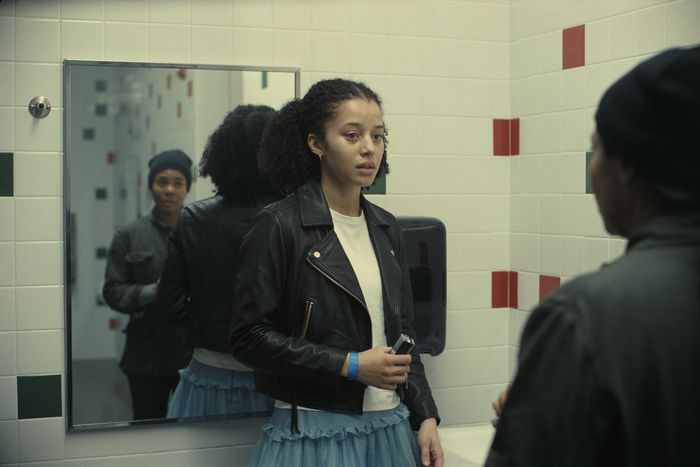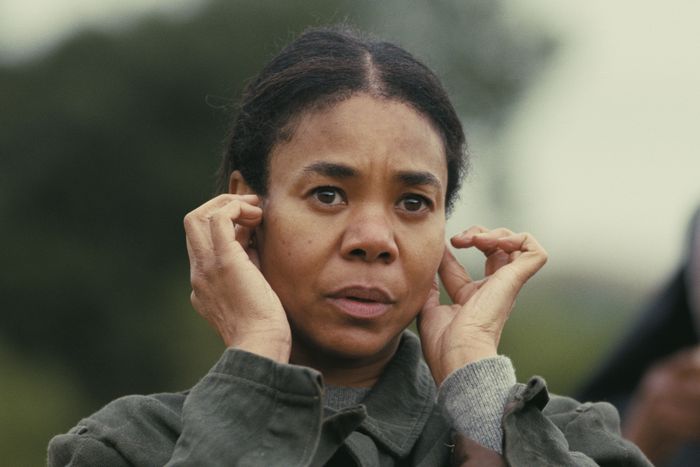Teyana Taylor (above), Chase Infiniti, and Regina Hall propel the film’s most conflicted ideas, for better and worse.
Photo: Warner Bros.
After seeing One Battle After Another for the first time, I walked out of Chicago’s Music Box Theatre into an unseasonably balmy fall afternoon and learned that Assata Shakur had died. Shakur was a legendary revolutionary with the Black Liberation Army who in May 1977 was convicted of killing a New Jersey state trooper in a shoot-out that left her wounded and another comrade dead. Two years later, Shakur, aided by other BLA members, escaped from prison and was granted political asylum in Cuba in 1984, where she resided until her death. During Barack Obama’s presidency, she was added to the FBI’s Most Wanted Terrorists list, and her bounty doubled to $2 million. She long proclaimed her innocence.
Teyana Taylor cited the complicated, controversial Shakur as a touchstone for her performance as Perfidia Beverly Hills in Paul Thomas Anderson’s tense, propulsive, and heartfelt One Battle After Another. The movie opens on the steely gaze of Perfidia as she canvasses an immigration holding facility along the U.S.-Mexico border. Perfidia is a leading member of the French 75, an incendiary far-left group whose raid on the facility and its fallout composes the first 30 or so minutes of the film. While the rest of the French 75 help the immigrants escape, Leonardo DiCaprio’s bomb expert “Ghetto” Pat lights up the twilight sky as an announcement of their revolution and, more importantly, to impress Perfidia. She’s preoccupied though, training a gun on the facility’s head officer, Colonel Steven J. Lockjaw (Sean Penn), whose RFK Jr. rasp and licentious focus on Perfidia sets him up as a comedic draw and a convincing picture of America’s sanctioned white violence.
Anderson breezes through monumental shifts from there — Perfidia’s deepening romantic relationship with Pat, her subsequent pregnancy and postpartum depression, the beginnings of a psychosexual dynamic with Lockjaw, the downfall of the French 75, and the splintering of the lives associated with it. Perfidia rats out her group in order to stave off a prison sentence after a bank robbery goes awry, and she kills a Black security guard. (Shakur may have been an inspiration for the character, but she was never a rat in life.)
The story picks up 16 years later after Perfidia has escaped witness protection. Not much has changed in the world, she says in voice-over. Ghetto Pat now goes by Bob, who is less a dutiful parent to 16-year old Willa (Chase Infiniti) and more a frustrating and paranoid obstacle in her small-town California life. DiCaprio is hilarious in the role of a burnout revolutionary without much of an internal compass, bringing slapstick physicality to the drama he inhabits. He’s perennially high, whether he’s hitting a vape or nursing the remnants of a joint held precariously between scissor blades. But Anderson punctures his weed haze with the bright light of a past that in actuality never dimmed, when Lockjaw begins to hunt Pat and Willa.
One Battle After Another is a full meal in ways so few films of this scale and budget (by most accounts, more than $130 million) these days are. It is expertly directed and lensed, brimming with aesthetic prowess. At the same time, it makes a spectacle out of its philosophical ideas. It’s a quicksilver film, shifting and melding solemn character reflections with amusing internecine conflicts. At its worst, the humor, enlivening on the level of entertainment, undermines the horror we’re otherwise witnessing. At its best, the discomfiture paves the way for charged performances — none more crucial than Teyana Taylor’s Perfidia.
Perfidia is a contradiction nestled in thorns, selfish and prickly and bold. Taylor brings to life a kind of flawed rendering of Black womanhood that I have longed to see in cinema. Not aspirational, but something more meaningful. Genuinely complex, authentically inhabited. The image of Perfidia swollen deep in her pregnancy, firing off an automatic machine gun, says it all. There’s nothing simple and warm and sacrificially maternal about this woman. She’s jealous of her baby daughter, racked with hormones and memories of a complicated birth. Every image and voice-over carry the friction of expectation that she should be something more upstanding and easy to root for. Taylor’s performance doesn’t ask you to root for Perfidia so much as be galvanized by her.
Watching Taylor (who physically occupies only a slim portion of the two-hour-40-minute film) as well as Infiniti and Regina Hall (playing the most mature and committed member of the French 75), it becomes evident that the Black women of Anderson’s ensemble are the MVPs. They ground the most contested segments of the emotionally and intellectually ambivalent story. If you don’t know Anderson’s work, from the capacious Boogie Nights to the deliciously austere Phantom Thread, you might expect a movie about revolutionaries to be interested in what it only glances at: liberation. Perfidia ultimately is a frame for the portrait Anderson is more interested in: a father-daughter story that considers what elder generations are leaving behind and what their children must navigate when a parent’s sins come crashing into their lives. Any time the film coheres into a robustly realized depiction of the mood of this present American moment, as absurd as it is violent, it’s a testament to the abilities of its cast. The Black women of the film are lightning rods for the most forceful conversations the film can bear, and it’s thrilling to watch them embody what Anderson’s script can only loosely hold.
Chase Infiniti as Willa.
Photo: Warner Bros.
Take, for example, the way Taylor performs Perfidia’s sexual relationship with Lockjaw, which begins after he discovers her planting a bomb near a courtroom. He’s been stalking her by this point, and not because he cares much about the French 75. They can continue their efforts as long as she meets him at a motel. The film adopts Lockjaw’s leering gaze over the curves of her body in a crucial scene before this fateful meeting. Lockjaw’s desire to jerk off from behind binoculars in his car is only thwarted when he sees Pat grab her ass, both of them smiling and giddy with the energy of genuine connection. There is a brief moment after the first sexual encounter between Lockjaw and Perfidia, when, as she leaves the motel and walks through the stifling darkness of night, a flash of regret and consternation marks her face. Beyond that, the script makes it difficult to glean how Perfidia feels about her own lost sexual agency in a coerced situation, or her betrayal of Pat — or, later, how she feels about her decision to rat out her compatriots in order to survive. In these moments, Taylor carries herself as if her revolutionary efforts are an emotional impulse: armor.
My mind can’t help but linger on Taylor’s line delivery around a fire one evening. “What’s this pussy for?” a now pregnant Perfidia asks fellow French 75 members, before answering in the same breath: “War.” But what kind of war is she raging? Taylor’s face implies infinite possibilities, as much personal as political and conflicted in both directions. In general, it’s hard to get a grip on what the French 75 stand for, beyond, say, their bombing of a politician’s office over an abortion ban. The particularities of a revolution aren’t Anderson’s primary concerns; he plays Gil Scott-Heron’s “The Revolution Will Not Be Televised” over the end credits as a nod to what can be achieved in the confines of a Hollywood movie. There’s more to consider in the film’s intimate relationships, specifically how Pat and Lockjaw relate to Perfidia.
Pat and Lockjaw are two reflections of a similar phenomenon: white people’s deep, erotic fascination with Blackness. After the initial raid, Perfidia jokingly asks if Pat likes Black girls. “Of course I like Black girls. What the fuck do you think I’m here for?!” he laughingly responds. Later, Lockjaw tracks Pat in a grocery store. The father has no idea who Lockjaw is, which allows the obsessed military officer to get close and mutter the thought they share: “You like Black girls? I love them. Love ’em.” Anderson gives too much weight to the comedic notes of scenes like this — and is too forgiving of the softness in Pat’s role as a father — to look more keenly at the impulses lurking behind that thought. But the suggestion is apparent: These men are distorted mirror images. And Taylor telegraphs this through every beguiling movement, sometimes slinking, other times exuding braggadocio.
The camera’s preoccupation with the architectural wonder of Taylor’s visage can be cloying, especially when the film’s descent into the libidinal lacks the context of clear motivations and layered psychology. Perfidia touches herself while Pat explains a bomb mechanism and demands to fuck just as an explosion they planted is about to go off, all of which Taylor performs with astute commitment. Anderson ties her interest in revolution to her eroticism; the idea of violently capturing freedom for herself and others turns her on. The problem is that, beyond his affectionate interest in the individual revolutionaries, the French 75’s political values remain undeveloped.
“I am what Black power looks like!” Shayna McHayle’s Junglepussy exclaims at the beginning of the bank-robbery scene. Is she? The exclamation has the scent of doubt. If you don’t know that McHayle regularly performs under the name Junglepussy as a rapper, you might miss the cognitive dissonance and the fact that Perfidia uses one of her bars in the good-bye note to Lockjaw: “This pussy doesn’t pop for you.” Taylor leaves the film only to remain a presence that haunts it in voice-over. In her final moments onscreen, she walks past the Mexican border, head high and back rigid. Her physicality sends one message: She will do anything to survive. As Perfidia’s mother tells Pat, “You are not suitable for my daughter. My child comes from a whole line of revolutionaries … She’s a runner and you’re a stump.” I just wish Anderson took a beat or two more to delineate what she’s running from, or to.
Regina Hall as Deandra.
Photo: Warner Bros.
When Black people speak of revolutionaries, it can sometimes happen in a hushed reverent tone that avoids flaws and ignores where politics might have swayed later in life. People — including real-life radicals — are messy. The boundaries of their politics, personal lives, and morality are porous. This is most obvious in the image of Perfidia, a tornado of energetic reappraisal and erotic possibility. A reminder that the representation conversation can be a trap and that attempting to define Black characters in cinema as either materially positive or negative is a failure of imagination. Black revolutionaries, on screen and off, can not be irrefutable monuments to what Blackness should be.
Where Perfidia is a bramble of hard-edged contradictions, Regina Hall’s Deandra is the most steadfast and straightforward character in the film. What you see is what you get with Deandra. She’s hyperfocused on the cause and hypercapable of executing its missions; nothing else about her is as legible. She stares at possibilities with honesty in order to calculate survival. She wears this responsibility with grim conviction. But when she hugs Pat good-bye, with an “I love you” and the gentleness he needs to rush into a new life with a baby by his side, there’s a flash of the levity that could otherwise be further developed. Hall’s performance demonstrates a flinty understanding of the consuming costs of fighting against fascist powers. It’s tantalizing to watch her speak with Sister Rochelle (a magnetically wry April Grace), discussing Willa, Perfidia, and the point of revolution. “You got more fight than the rest of us, Deandra,” Sister Rochelle says between drags of a gracefully held joint. (Apparently, the nun got tired of the costs of liberation long ago.)
In many ways, Deandra is Perfidia’s thematic foil. If Perfidia is a character study, Deandra is a note on what it takes to survive such revolutionary struggles with your sense of self intact. But Hall’s screen time feels far more limited than Taylor’s, which is frustrating in light of how enamored the movie is with Penn’s performance: all stiff-walking swagger, licked lips, and uncomfortable gestures of ostentatious white Americana masculinity. If any of the men in the film deserve a lingering lens, it’s Benicio del Toro as Sergio St. Carlos, a karate teacher and the head of what he calls some “Latino Harriet Tubman shit.” His sequence in the film is the closest Anderson comes to exploring the tricksy force of community in revolution. Otherwise, when Taylor and Hall aren’t present, the film leans more heavily into comedy. Constantly landing on jokes — like in its portrayal of Lockjaw and his efforts to become a member of the Christmas Adventurers Club, a powerful white-supremacists faction — siphons a sense of urgency from the film’s sketches of American unrest and white male violence. The danger and horror of these people is dulled.
But then there’s Willa. In One Battle After Another, Chase Infiniti declares her presence as a fledgling actress worthy of deep consideration and praise, holding her own against more experienced cast members. When Deandra confronts Willa in the otherwise empty bathroom at a school dance, Infiniti brings fear and curiosity and the barbed self-assuredness of a teenager to the fore, merely in the slight adjustments to her facial expression. Here is a child confronting the truth of her parents for the first time. Willa will have to learn the hard way that her parents’ humanity is as fraught and dynamic as her own.
There is a level of complexity to her character lost because of how focused Anderson is on her psychology, primarily as it relates to her father. In conversation with Sergio, as Pat waxes on about what Willa has lost in Perfidia’s absence, he admits, “I can’t do her hair, man, you know that? I don’t know how to do her hair right.” It’s a familiar, burdensome experience of Black biracial children struggling under the limited understanding of their white parents — an experience even Anderson’s partner Maya Rudolph, herself the daughter of R&B legend Minnie Riperton, has referenced. But it rings overly simplistic here, as the film glides along the surface of considering how Willa feels about her mother’s decision to leave her or the fact that Perfidia wasn’t just a badass revolutionary but a rat and a woman whose inner truths remain unknown. Do Pat and Willa ever have a meaningful conversation about that? If so, we don’t see it. Instead, in the closing scenes of the film, Pat gives Willa a letter her mother sent to them at some indeterminate time in the past. “Hello from the other side of the shadows,” Perfidia’s voice-over muses. “I pretended to be strong … Is it too late for us?” Perfidia, like Pat and others of their generation, hope Willa and her cohort are able to usher in a more equitable future that they couldn’t.
That Anderson positions a Black biracial character as the emblem of a better tomorrow has a flicker of naïveté. But One Battle After Another is ultimately not a subversive film. Due to its willingness to stare down a moment in time, the movie can feel like it should be more politically forthright and precise than it is. Other studio films might avoid the now, the absurdity of people’s refusal to acknowledge contemporary truth and the outright peddling of lies, and so Anderson’s decision to at least muse at the surreality can shift audience expectations. And at its very end, One Battle After Another becomes something of an almost liberal fantasy: Lockjaw’s pursuit of Pat and Willa fails. Free from the shadows and forces once looming over her life, Willa rushes off to a protest in Oakland while Pat trades his all-consuming paranoia for more technological trappings: He gets an iPhone and delights in taking pictures of himself. The future is Willa’s prospect, so why would he pick up his politics again?
But the first 30 minutes of this movie is a blueprint for how to consider the entire film. One Battle After Another doesn’t fully capture the hellishness of the present so much as look at it and not lie about what it sees. The discomfort that arises in watching Perfidia rat on her comrades or Lockjaw proclaim his rapacious desire for Black girls courses through the finale. Anderson leaves just as much, perhaps even too much, at the level of conjecture, and in these voids confusion brews. What are we to make of the bitter absurdities that define today’s America, and what should we expect a medium like film to do in representing it? A film will speak politically whether its makers intend for it to or not, but storytellers shouldn’t be compelled to give neat, prescriptive messaging perfectly calibrated to the moral temperature of an audience. Anderson’s script might grant only the wisps of Black women’s interiority, but in that blank space, the potent skills of its actresses are able to flourish. Political prescription isn’t the point; teasing out the humanity of these people is.









